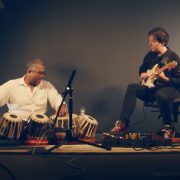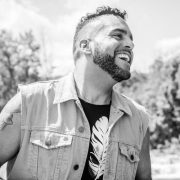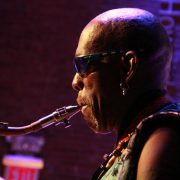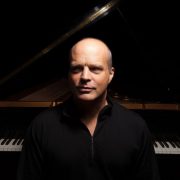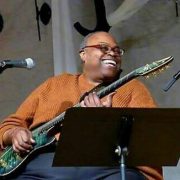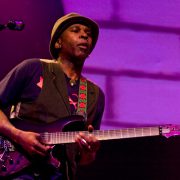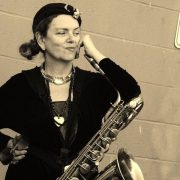Wake Up the Voices
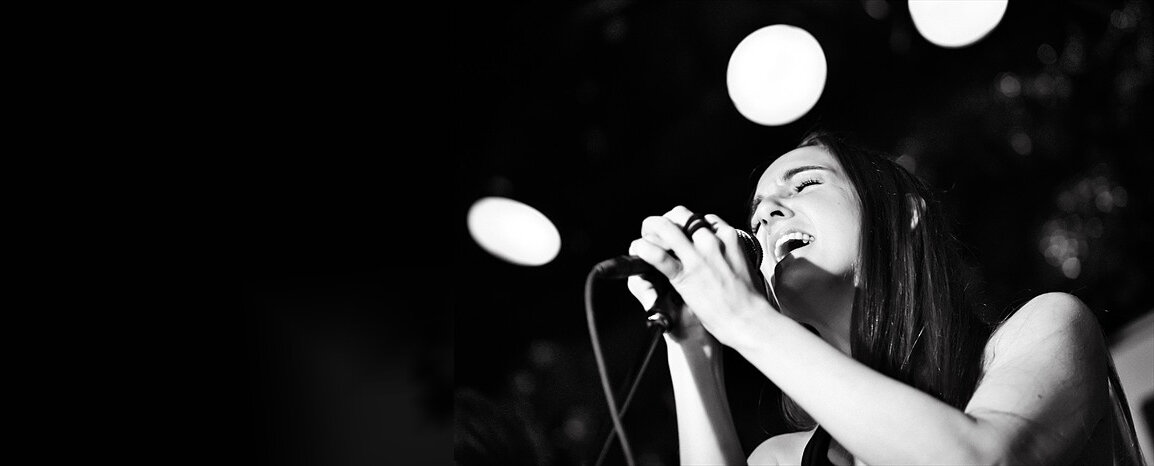
“My mission is to wake up the voices. We need all the voices, we need all the songs. No one can be left out. We need all of them, more than ever. The more people can step into owning their power and their magic and their capacity to heal themselves and heal this world, the better.”
— Stephanie Rooker
Summary
Today we’re gliding into the mind of vocalist Stephanie Rooker, founder of Voice Journey. Her practice encourages you to think of your voice in a new, empowered context and use your voice in ways that can change your life—reduce stress, energize the body, increase mental clarity, improve mood, enhance communication, develop leadership skills, enrich relationships, and boost creativity. Her approach is transcendent—a tonic rooted in tribal and scientific knowledge about fundamental human truths.
You’ll hear us talk about the power of listening with our minds AND bodies. Finding our voice and using it to heal discord and pain and expand our capacity for creativity, connection, and joy. I could not be more excited to share this conversation with you. I think I’ve gently fallen in love with Stephanie, and I think you will too.
Credits
Music: Ben Tyree
Producer: Leslie Askew
Transcript, edited for length and clarity
Stephanie: I hear the voice of my grandmother calling. I hear the voice of my grandmother call. She says, wake up, wake up. She says, wake up, wake up. Listen, listen. Listen, listen.
Ioana: That’s Stephanie Rooker. Hi everybody. Welcome to Blissfully Aware brought to you by The Daring. Here we are, a few months into the podcast finding our footing and getting to know you, and it’s time to give this series its name. Blissfully Aware it is because we find peace when we’re awake and deeply connected. I know I do, and it’s the main reason I do this work. I’ve had the privilege to hear the same from you. So thank you for that.
And how perfect that in this week’s episode were gliding into the loving mind of Stephanie Rooker, who is a vocalist and founder of Voice Journey. You’ll hear us talk about the power of listening with our minds and bodies, finding our voice and using it to heal discord and pain, and expand our capacity for creativity, connection, and joy. I could not be more excited to share this conversation with you. I think I’ve done only fallen in love with Stephanie and I think you will too. Here it is.
Ioana: Hi Steph! Thank you so much for coming on. I am so excited to chat with you.
Stephanie: Me too.
Ioana: So let’s get to it. I would love to set the scene a little bit. You’re the first guest who is vocally inclined and uses that talent to do everything. Put us in the right place.
Stephanie: Sure. I’m a vocalist, and I teach voice with a holistic approach. So it’s not just about “how to sing,” but looking into what our voices are for us how they function in how we express ourselves, whether that be creatively or just communicating and also just how our voices deeply connect with who we are.
Everything that we’ve been through our voice has been through with us. And so we carry that. The voice knows us inside and out and reveals things about us, sometimes when we don’t want it. And there’s also something about our sound that is beyond us, in that it is energy. And so, my work with Voice Journey is really about tapping into that relationship in a very profound way and exploring the bounds beyond ourselves that the voice can take us to when we listen to it and when we let it.
Ioana: How did you start singing?
Stephanie: I’ve been singing since I was a little kid.
Ioana: Yeah, so it’s been with you.
Stephanie: My mom was a singer and accompanist, and my dad is a huge music lover. Yeah, so my mom would sing with us me and my brother and sister when we were little. We were always singing and church choirs and stuff like that. I grew up in the Blue Ridge Mountains of Virginia, so there would be small community festivals. They would have talent shows, and we would get up there and do our numbers. It was just always a thing. We emphasized singing in my family.
Ioana: That’s beautiful. And at some point along the way, it became more than just singing for you.
Stephanie: Yeah. I started very early. I was really into imitation, really zooming in my listening to my favorite singers and picking up on what they were doing. How was their voice doing what they were doing? Imitation was how I learned to sing because I would listen and imagine how it would feel if a particular sound was moving through my body, and then I would let my voice do that.
Ioana: How?
Stephanie: A lot of it was feeling and somatic imagination. I’d imagine the shape of the sound, the feeling of it, the color of it. I would get multi-dimensional. It’s funny to talk about it now because I didn’t think about it like that then. It was just listening and was so zoned in that I would put myself in the sound.
I remember my mom singing some Aerosmith song in the kitchen one day, and I was like, “That’s not how he sings it.” She was singing the song, but not like Steven Tyler. Zooming in on that level wasn’t just technical for me. There were many other layers of the music I was accessing, exploring, and allowing to come through me.
Ioana: I’m imagining it as a visual and physical experience.
Stephanie: Mmm sensation based. And then, you know, I would prescribe music for myself. If I liked a boy, you know, we all do that, we have our jams. I took it pretty far. I would DJ myself through breakups and tough times.
I would go in and play all the songs. Splay out my CDs all over the floor and create a rotation that would help me go deeper into the feelings that I was feeling. I’d do that until I felt cleansed, or like I had exorcised that feeling.
Ioana: Was facing what was happening within you ever deeper a way through?
Stephanie: Yeah. Music was always medicine for me. It was like my companion. I used to have a shirt that said: “you’re never alone with music.” It’ll go with you, and meet you where you’re at and go with you and to whatever depth you want to reach. And then bring you back out again.
Ioana: And it stayed with you. From your home, where you were singing with your family and laying out the soundtrack of your life fast forward many years, you are running a business in New York City, healing and opening people up through sound. Tell us a little more about that.
Stephanie: Yeah, sound is a visceral element. It’s so efficient and effective in connecting with our bodies and adjusting our bodies on profound levels.
You can think about how hearing a song can shift the way you feel, or if you’re in a store and there’s music playing, you don’t consciously register it, but your head is bopping. Your body picks up on sound. The body is responsive to sound.
So a big part of my work is first reconnecting to our bodies through listening and sound. I see that as meditation — expanding knowledge of your body, listening through your body, and listening to your body.
I work with some instruments, but I prefer the voice as the principal instrument because it’s in us. And it knows us. I can’t tell you how many times people come and work with me, and we’ll be doing something very basic, and they’ll start crying. The voice will be moving something in them that will have been untouched for a long time.
Memories surface, sometimes trauma, sometimes longing, desire. The voice can unlock that for us and reconnect us with those parts of ourselves that we’ve put away or forgotten about or dismissed as not possible or not worthy.
Ioana: That’s so powerful. How do you create a safe space for people to relax enough to do that with you?
Stephanie: You know, it’s an interesting question because it’s a skill for sure. It’s funny, for a long time I didn’t realize it was a skill that I was cultivating.
One of my favorite collaborators and favorite humans is Sarah Capua — a yoga therapist and yoga teacher — and we worked together for many years teaching sound body yoga classes. I remember early on in our working together; we were talking about this. As I remember it, she was saying, “You’re great at that. It feels like you’ve cultivated that skill of holding space and making that space feel comfortable and accessible.” It wasn’t until then that I realized that, yeah, I have.
I always go back to listening because listening is receptive; listening is holding space. You’re not thinking when you’re listening, you’re curious, you’re open. You’re not even expectant. You’re just being and absorbing what’s happening at the moment. And so my body is a massive part of that.
I also tune in on a somatic level with people. I see how they’re sitting and moving, and be in resonance with them and get information that way about how I can best hold space for them.
I also listen to people’s voices. I naturally lean to this from my early years of imitation. And one of my teachers Pat Moffitt Cook — incredible sound healer, ethnomusicologist and masterful Vedic chanter — can listen to someone’s voice go all the way up and down and identify physical issues in the body. That was great teaching to me too that the sound and the body are connected. You can feel the body through the voice and vice versa. So that all goes into holding space and listening.
Another brilliant teacher Wendy Young teaches early music at Princeton, and she’s been working in sound forever. She’s amazing. We did training together in Atlanta. She says that when you’re working with someone, your higher self beyond your ordinary consciousness and their higher self agree about this thing. They’re hovering above you talking about what they’re about to do. I love that image because it takes it out of the “What do I need to do? How can I fix this? How can I help this person?” Which can get laborious and inhibitive.
If I’m sitting here thinking, “Oh, how can I help you? What can I do for you? How can I fix this problem you’re having?” then I’m not actually with you. My desire to change and improve you limits my empathy. And this gets to this ego thing — to be a “healer.”
Ioana: I fix things.
Stephanie: Yeah, “I fix things.”
Ioana: There’s such a premium on that in New York City. So the fact that you are cultivating this sacred space of quiet and introspection within the broader New York City environment is exceptional.
Stephanie: Thank you. All those layers go into it. Sometimes I’ll just be listening and whatever you want to call it intuition or me tapping into the conversation between my higher self and the higher self of the person I’m working with, and I’ll get a hit: drum, or this exercise, or something else. Something that I’m not strategizing for, but it comes because it feels great. That’s another thing, somatic empathy. If it feels good to me, that’s good. If I tune into the person, I trust that I am picking up on what’s happening with them.
And so if I feel something in my body or feel a sense of unease, it’s good to say those things sometimes. “I’m feeling this thing. What do you feel?” And then it’s out there, and we can talk about that.
Ioana: Hmm. You know there have been so many times I’ve been in traditional therapy, and some things will flow through me, and at the moment, they might seem too little to acknowledge to myself, let alone out loud. But the times that I have voiced them, it turned out that they weren’t such little things after all. They’re like taps from the little person inside me saying, “Let’s look at this.”
Stephanie: Yeah. I think we get those indicators a lot and don’t think much of them — especially discomfort. We want to put it aside or say we’re fine. But to say “I feel a tightness in my chest right now” or “I feel like my eyes are going to water”… that’s an entry point to going deeper and exploring your experience and what your body is telling you.
Even pain. I work with pain that’s not about fixing it, but about leaning into the pain to relate to it and connect with it and give it your compassion.
I am telling my students all the time, especially with ourselves, we’re so quick to dismiss. And say, “I wish I didn’t have this pain. I wish it would just go away.”
Ioana: It’s like inadequacy. There’s a prejudgment happening.
Stephanie: Mmhm. It shouldn’t be this way. And therefore I don’t want to deal with it. But the way I like to think of it is if your dear friend came to you and said, “I’m in pain. I’m hurting right now.” Would you do the same thing? Would you tell them to go away? That you don’t want to deal with it? That you don’t have time for them to be in pain?
Ioana: How do we make the leap from self-neglect to imagining what you just described?
Stephanie: There’re so many beautiful practices. I learned one from another teacher Louise Montello, a brilliant psycho music therapist from The New School.
It’s called Sounding the Body. It’s using sound to connect to those parts of ourselves and explore them so that it’s not a heady thing. The body is nonverbal, so the sound is excellent. You can make whatever sound of that feeling that you have and let that out. In this practice, there’s a mirroring aspect. So if we were doing it, you would make the sound of your feeling, your sensation, and I would make the same sound. Thus not only are you making the sound, but I’m affirming it. Saying, “Yeah, we hear you. We’re listening.”
Humans have been using sound like this since the beginning of humans. When I teach classes, I say that I’m not going to show you anything new. You know all this stuff, there are no new things. We’ve always used sound. On some level in our DNA, we know a sound is a tool for us. Music helps us. That’s why when we’re frustrated, we go, “Uuuuugh!” To reclaim that as an intentional tool, as a medicine that we apply for specific purposes, is very powerful.
It’s beautiful that sound is blowing up right now. Everyone’s into sound baths and things of that nature. It’s so good because we need to reconnect with ourselves. We need to remember that we have this capacity to be more fully awake in our bodies and with each other.
I’m in grad school, finishing my last semester of my master’s degree in mental health counseling. And I did that because, in my private sessions and some workshops and retreats, people’s stuff was coming up. People’s trauma was coming up. It comes right up. I felt good and strong and capable of holding the space for people to feel safe for that to come up. But Louise Montello, the teacher I mentioned, and a dear friend of mine Aly Sun Panichi, a brilliant music therapist, singer and songwriter, they both passed away really suddenly. And it was time for me to get my piece of paper that says I can bring this to more people and not have it just be a yoga studio thing. Bring it into spaces where it’s needed.
Ioana: What do you see that need?
Stephanie: I think we all need it. Happenings in culture and the world right now indicate our need to reconnect to ourselves, each other, and our planet. It’s a fundamental disconnect that’s happened.
There are also people dealing with all manner of health issues, physical issues, pain, mental health issues. This tool is so helpful, and it is not mainstream. I teach with Community Health Care Network, it’s a low and no-cost medical clinic, but they do everything. It’s a wonderful organization with clinics all over the city, and they have a robust wellness program that’s free for their clients. People can come and take a yoga class, a sound meditation class, Reiki, or Qigong. Amazingly, they’ve integrated wellness into their medical model.
What I hear so much from patients there is that the sound work helps them feel more agency. It helps them connect to their bodies while they are going through the healing processes and not feel as if the doctor is like a mechanic treating a car.
When we can reconnect in this fundamental way with our bodies, the body responds. The body heals better; we manage pain better; we reduce our stress with these things. Stress is major!
I think everyone needs it. It is necessary in places where people need that healing and the reminder that they have agency and tools that will make a massive difference for them.
Ioana: How do you work with people who have lost their voice? Or with people who believe they don’t have a voice?
Stephanie: Oh, I love working with those people the most. You know, so many people come to me and say they don’t have a voice, they can’t sing, or their teacher told them to mouth the words in elementary school, or someone told them they should never sing. And it’s criminal to me. Because shutting that down is essentially saying that your expression is not valid. Or is not valued. This idea of a good voice is ridiculous because it’s relative. It’s a construct.
My approach is to start simple. Allow people to connect with what the vibration of their voice feels like in their bodies. Humming is the first essential thing I do in my classes. We hum one note. It doesn’t matter how steady or how long it is. You can feel it vibrating, your chest opens up a little bit, and it wakes you up to the fact that your voice can do this thing.
Ioana: Pretty cool!
Stephanie: It’s so cool. So, number one: remind people that their voice is magical and can do this awesome thing. We start from there and build what your voice can do for you.
Stop having the voice be a measure of your attractiveness, or your goodness, or proficiency or how much you value you have. And realize how powerful an instrument you are and tap into that. I think the hardest part is for people to get out of the way. Once you get out of the way of your voice and stop trying to tell it what you think it needs to do or how you think it needs to sound — oh my God — everything changes.
Sounds come out of people that blow them away. And yeah, your voice can do things you can’t even imagine, if you can get out of the way, trust it, and provide the support it needs. That’s where technique comes in — breathing in a way that gives your voice the most opportunity, the most possibilities.
I see technique as the scaffolding. You can set up the method only to where it supports your voice do what it wants to do. But not to where it gets so much that you’re fixating on every detail of it. Have enough technique to feel like you have a strong foundation to support the voice, and then there’s this balance of surrender and structure.
Ioana: Oh, I love that dance. Can you paint more of a picture of that beautiful tension?
Stephanie: Yeah! With every student that comes to me, I have to determine what that balance is. I have people come from a full spectrum of experience. Some people say they never sing, and they don’t know anything. We’ll sing together a little bit. First, we’ll hum along. I’ll tune in and see where they’re at, and sometimes they’ll need a bit more structure to help them feel safe and supported that they can support their voice. And then we go freedom. Go into a little bit of surrender.
Some people come in with a ton of technique. Trained singers, professional singers, come in and say when they perform, they feel like they’re not connecting with themselves. They know how to do all the things. They know their instrument intimately. They know the mechanics of it. They know how to control the voice, but that’s the problem. They’re controlling the voice and to unhinge some of those control mechanisms is challenging. It can be scary. But to let some of that go so that they can surrender a little bit more, there are tons of beautiful practices that do that dance of structure and surrender.
Ioana: Talking about surrender triggers the idea of shame. Being too ashamed to do that, sounds familiar?
Stephanie: Of course. We can talk about it in terms of shame, and we can also talk about it in terms of fear. The way I see shame is like hiding. Like something needs to be hidden. It’s a little different than fear. They’re connected but not the same. So with shame, I would give more foundation, support, safety, and cultivating that connection with the voice that feels good to the point where that good feeling is stronger than the need to hide.
Fear is interesting because so many people get shut down by fear. The way I like to reframe fear is to interpret it as “this is important.” You know, before I’m going to perform, I feel the quickening. And you can take that as this is important because it is a profoundly intimate experience. It’s thoroughly exposing to sing for people.
Ioana: It’s almost like you’re pulling the inside out.
Stephanie: Yeah. You are the instrument. You can’t hide behind a guitar. You can’t blame it on the sticky pads on your saxophone. The instrument is you. All the things about value, worthiness, goodness, all the judgment stuff come up in those crucial moments when you’re going to share something from your soul.
Ioana: People are going to see me. Me, I’ve been tucking away at night. That’s scary shit!
Stephanie: Uh-huh! And it happens for everyone. People always believe that professional singers don’t have that. They are just cool with it now.
Ioana: No, they’re not.
Stephanie: They’re not. They learn to work with it, learn to reroute it. Or they have gotten so good at manipulating their technique that they have become satisfied with the sound, and they can hide behind it, which is another thing. We were saying before people come to me because they feel like they’re not connecting. They know how to sound good, but they don’t feel seen. It’s because they’re hiding behind the technique.
So it’s something to sing. It’s incredible because despite those things that we’re most scared of when we come out and sing, and we’re seen and heard and when we’re received — it’s so powerful.
Ioana: Cathartic.
Stephanie: It’s incredible. In a lot of workshops, I do call and response, and I like to pass it around. Anybody willing can offer the call. The idea is that this is not your solo. It’s not your time to shine. It’s the offering of your experience right now, whatever that is.
And I always encourage people because it is so powerful to offer something of your experience and then have people give it back to you. What a gift to put it out there and have people receive it, take it in, and say, “Yeah, we hear you. Here’s how well we were listening to you. Here’s how much we care.” And it’s so powerful that idea of being heard.
Ioana: And feeling not alone. The voice helps everybody feel connected and interconnected.
Stephanie: Yeah, there’s nothing like singing with other people. There are studies. Studies have come out! Hahaha. Science is telling us. If you need that validation, it’s there. There’s data that says people who sing in choirs have lower stress hormone levels.
Ioana: Whenever I go to a yoga class, the chanting is my favorite part and. I’m one of those people who grew up hearing that they don’t have a good voice and should not sing. But when I go to a yoga class the chanting in the beginning, and the end is something that I look forward to because it’s my one outlet to sing in public with other people and it’s great!
Stephanie: That’s great. You know, fundamentally, it’s because we’re vibration. We don’t think of it that way. We believe we’re solid, but we’re mostly space and vibrating all the time. When we sing, and our voices mix with other sounds and create this ocean of vibration that we’re all swimming in, we realize how one we are.
If you have something to say and you give your voice space, support, and freedom to do it, things will start coming to you. And the realization of the importance of them will be stronger than your fear of it.
Ioana: Creating things bigger than ourselves that help us connect can relieve fear.
Stephanie: Yeah, and I would even say creating from the suffering liberates us from it. Another one of my teachers Silvia Nakkach wrote an incredible book Free Your Voice. And there’s a chapter on rasa, which is the Indian term for mood. There’re many rasas — heroic, comic and melancholy, etc. There’s one section where I wrote in the margin “hurt so good.” Her words reminded me of the blues, which I see as healing music. It was music that came from sorrow to relieve it. Expressing it and listening to it was healing. Here’s the quote:
“The mind experiences conscious joy even in the representation of painful events because of the integration of perceptual, emotional, and cognitive faculties refined by subtle aesthetic dimensions of sensing, feeling, and listening.”
— SILVIA NAKKACH
Ioana: What I love about it is that it acknowledges that we can convert pain into something uniquely powerful. It might even be a special sauce. That’s not to say that we should all be depressed, hurt people. Not at all. But we all suffer to a degree. So, can we look at ways of acknowledging the suffering and then figuring out how to route it?
Stephanie: Yeah, you’re right about acknowledging. It is number one, especially when whatever the pain is echoes into multiple layers of yourself or far back into your history. Just coming to terms with it and accepting it is very difficult.
I’ve been doing some shadow work myself recently and had the experience of seeing this large, dark piece of myself. I’m aware of its operating in many aspects of my life. And it’s come to a point where I had no choice but to dive down into it and look at it.
And I hit that point of “Fuck. What can I do? What do I do about this?” I know this thing is not the whole truth of me. But it’s so intense. And I felt that internal struggle with it. And then finally, of course, when I wasn’t thinking about it, it occurred to me that I need to be compassionate with that part. I need to listen to it and acknowledge it and know that that part of me believes that lie. That it’s distorting how I function, see the world, feel loved, and all that stuff.
I’m practicing allowing that part to be precisely where it is, exactly how it feels. Saying, “Yeah, and I love you anyway, and I’m gonna keep loving you, and you keep thinking that.” Allowing that part to express itself, letting it that part write a song. I am singing the shit out of that song. Giving it that “Yeah, you feel this way. It sucks!” Yes, fulfilling it by acknowledgment and love.
My mission is to wake up the voices. We need all the voices; we need all the songs. No one can be left out. We need all of them, more than ever. The more people can step into owning their power and their magic and their capacity to heal themselves and heal this world, the better.
That’s my mission. Wake up the voices. Give people tools to get out of the way and let their voices sing the songs they need to sing, make the sounds they need to make, shed whatever conditions or constructs we take on that aren’t serving us anymore.
Ioana: That’s powerful. And you know, we can’t make an impact if we’re not well. If we can’t heal our divides, we can’t connect.
Stephanie: Yeah, last weekend, I had the honor and the blessing of being with the International Council of Thirteen Indigenous Grandmothers. They just released a book, Grandmother’s Wisdom; it’s so beautiful. Their mission is to travel to their homelands and offer prayers for peace and remembering our connection to Earth and each other. Just being around them is a profound experience.
Grandmother Maria Alice from Brazil said that what we’re up against is not ideological. It’s not political. That’s not the problem. The problem is that there is a fundamental disconnect between people. And between people and the planet. She said, people can pass all the legislation they want, that ain’t it. We’re not treating the right source of the issue. The problem is a disconnection from the source of truth and inherent relatedness to each other and this planet.
I feel like sound is one way to restore that connection. Heal that relationship to ourselves and each other and the planet.
Ioana: Right, because you could easily externalize and say it has nothing to do with me. I recycle and compost; I’m a good person. It’s the legislation. It’s the other.
Stephanie: Yeah, you said, “the other.” I had an incredible thing happen over the summer, where I connected with some people I’ve known all my life. They are Republicans and Fox News watchers, and we’ve always been very cordial. I spent time with them, and I did a full moon ceremony, which I do every month in the Mohawk way one of my elders taught me. I invited them, and they came, and they did it.
It’s a gratitude ceremony. You pour your heart out, and it takes as long as it takes. You can be sitting there for three hours, everybody thinking of every single thing they’re grateful for, and it’s beautiful. Nothing connects people like that kind of outpouring of the things they cherish.
After we did that ceremony, they said to me that it was lovely, sincere. It wasn’t just a woo thing. We spent a little bit more time together sitting around the table talking, and this one gentleman said to me, “Isn’t this great? You can have your beliefs, I can have mine, and we can sit around the table, enjoying ourselves together?
It’s great. It’s what we need — to remember the connection that we have and can cultivate and make stronger than our ideas about the way things should be.
When we do that, we can listen better. And if we can hear better, we can expand our possibilities of collaboration. We can meet in the middle where we’re ideologically opposed or in conflict.
Ioana: Life is not black and white, we’re nuanced, and it’s important to remember that.
Stephanie: About that black and whiteness — spending the weekend with the grandmothers and with other natives I know is like a different reality. Apart from the constructs of how the world works. It’s a whole other way of thinking about life. The Mohawk elder I have was sitting with me one time in Prospect Park, and he said, you know this right here — and he gestured around at everything — there’s this, and then there’s the Native way. The Native way’s a different reality.
That stuck with me. How much of what’s real for us is real, and how much is it what we’ve come to believe is real? I mean, think of money. It’s a piece of paper, but it means that you can’t eat.
Ioana: Yeah, we construct it, and we subscribe to it without questioning. Do you think people mostly operate with the best intentions? When you meet somebody for the first time, do you expect them to be the kindest they can be?
Stephanie: I’m going to say yes, and I’m also going to say that they can, at the same time, be operating from shadows. Like I was saying about myself earlier, unearthing that dark part of myself helped me see how I was operating through it in hurtful ways. But that was true to me. That part of myself was running the show saying, “This is how it works. These are the rules of engagement.” And so in my capacity, I felt I was operating with the best intentions. And yet, my operating system included this program of this shadow. People think they are working with best motives, but there’s variation in the degree to which they’re aware of what other things may be operating as well.
So, for example, I’m going to say this. I think that the president thinks he is operating with good intentions. Because he sees himself doing the best from the rules by which he plays. We can see the distortion.
The press asked him about fossil fuels. And how they are devastating. The infrastructure of the land is completely compromised. His response was something like “there’s wealth under our feet.” How he sees it is that’s there’s money under our feet. We have to get the money. That’s how I read it anyway. Not the real wealth of a planet that is thriving and allowing us to thrive.
Ioana: It’s highly probable. I think he believes this is the right thing to do. So we are faced with totally incongruent ways of seeing life. Knowing this, how do we create the bridges? How do we see the humanity within each other and cultivate compassion to connect on a deeper level than our political and socio-economical divides? How do we find that quiet space to be able to connect deeper? I think that’s where your work comes in, so beautifully.
Stephanie: Thank you. I hope so. I like that you said finding that quiet space to connect because silence is so connected to sound. In most of the practices I do, we hold silence afterward to let the sound settle inside. To allow the body and the brain to integrate the vibration that just moved through us.
And at that moment, we can have this beautiful silent still point of sometimes bliss. That peak meditation moment people go for of beingness, pure, emptiness. Being in that silent space with others changes us and is another compelling way to connect.
And again, I think it’s all about getting out of the way. Can you enter a space and put your ideology aside, your politics aside, your judgment aside, put the things aside that make you feel separate? The voice does that. Even though it holds everything that you are and everything that you ever have been, it also is pure energy.
I was honored and privileged to take a workshop with Ysaye Barnwell, who is one of the founding members of Sweet Honey in the Rock. She teaches this rainforest chant from the Mbuti people of the jungle in the Democratic Republic of Congo. I love this chant, and I do it in my workshops sometimes. It goes in a round. When you do it, and you layer it, the voices are all moving back and forth. And there are these other little melodies that will come through that are made up of two or three different parts meeting and dancing together. Partially it’s the sounds of the rainforest. It’s the buzz, insects, and animals. But functionally, she taught that in the social organization of the Mbuti, this song is used to cultivate harmony amongst the people.
So you have to listen. And you have to be right where you need to be to have those other countermelodies, the secret melodies, come out.
Ioana: Like a secret code.
Stephanie: Yeah. And they would sing this if there was unrest, or disagreement, or some conflict in the community. They sing it for as long as it takes to come balance and harmony in the group where everyone is listening, and everyone’s voice is offering what serves the song and the community.
Ioana: Oh, man, I love that so much. That’s incredible.
Stephanie: Yeah, music, and singing can balance out conflict within a group. You know, maybe it doesn’t take on the issue at hand in that logistical or concrete way, but what it does do is reminds us of that connection and deepens our capacity to listen to each other. It sets us up to be in a place where we can restore balance. If we want that, we can get it.
Ioana: Is there anything we haven’t chatted about which you’d like to address?
Stephanie: The piece about taking care of yourself to take care of others. It’s also about freeing yourself. When we heal ourselves, we heal others. And when we free ourselves, we free others. So it has to start there. It is restoring our connection to ourselves and each other and the planet, healing what needs to be treated, looking at those dark places, and liberating ourselves in the ways that we hold back. We have an agency in that. I believe that it creates a chain.
Ioana: Right, because you’re modeling it out for other people who might not have the resources to do it for themselves.
Stephanie: Yeah, and also, when you do that, you get more clear about what your purpose is. And that’s the big piece. How can we each serve? How can we help each other and this planet? We all have a beautiful, brilliant unique capacity to do that.
Ioana: Things need to be quiet for us to hear that voice. All these narratives float in and out. “To what do I need to measure up? What is this other person expect of me?” Be it our parents, siblings, children, strangers on the street. All these narratives that were constructing and playing back somehow need to pause for our real voice to emerge and guide us on a path that feels authentic to us.
Stephanie: Yeah, as you’re saying that what came to me is — to what are we listening? Are we listening to those judgments, our expectations? Or are we listening to what’s happening at the moment? The other piece of that comes up for me is not only what are we listening to for ourselves, but how are we listening to others? That’s another powerful thing about gathering in workshops and retreats of this nature. Everybody shows up and learns to tune in in a way that uplifts everyone, in addition to freeing our voices and tapping into more in-depth sources of creativity and expression.
There’s nothing like feeling listened to lovingly. I think about that a lot when I’m out in the world with people. How am I listening to this person? Am I listening to them? Open to them? Trusting their best intention? A friend taught me the song, it says:
I hear the voice of my grandmother calling. I hear the voice of my grandmother call. She says, wake up, wake up. She says, wake up, wake up. Listen, listen. Listen, listen.
Ioana: Lovely.
Stephanie: Yeah, I love that. Wake up. Listen. First, listen. The next verse that comes through is:
She says stand up, stand up. She says stand up, stand up. In your power, in your power.
Listen first! Wake up, realize you need to listen, listen, then stand up. So, you know what you’re standing for.
Ioana: Awesome, dude. This was a great talk!
Stephanie: It was such a pleasure.
Ioana: Thank you so much for coming on.
Ioana Friedman is an art director and Editor in Chief at The Daring. She’s led digital creative at Estée Lauder Companies and e.l.f. Beauty and has served in a creative capacity at Magnum Photos and powerHouse Books.



